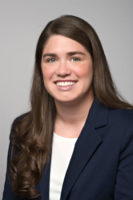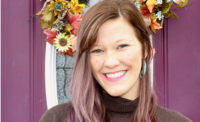Name: Rachel C. Stuckey
Age: 40
Title: Senior associate and Building performance engineering department manager, Erdman Anthony
Educational Experience: B.A., Physics – Goshen College, 2000; and B.S. mechanical engineering – University of Notre Dame, 2001.
Professional Credentials/Accreditations: P.E. – New York, Florida; LEED AP; Building Energy Modeling Professional (BEMP), ASHRAE; Certified Energy Auditor (CEA), Association of Energy Engineers (AEE), and Existing Building Commissioning Professional (EBCP), AEE.
Organizational Affiliations/Achievements/Awards: Certification Committee & BEMP Exam Subcommittee, ASHRAE; member – ASHRAE and AEE; secretary - New York Mennonite Conference Coordinating Council.
When did you fall in love with engineering?
When a high school teacher first suggested engineering to my parents, I wasn’t entirely sure what it was, but I figured that if it involved math and science, I was in. Over the years I’ve found that though math and science are at the core of engineering, the skills and aptitudes needed for success are much broader. Written and spoken communication skills, empathy, teamwork, creativity, and sales abilities are all extremely valuable for success. I enjoyed engineering from the start but have come to love it even more as I’ve been able to grow and apply a broader skillset to my work.
What has been the most rewarding aspect of working in the skilled trades?
It’s so rewarding to work with buildings – these are spaces that are visible to the community, and where people live their lives – whether we’re talking schools, offices, supermarkets, or manufacturing spaces. We’re tasked with the huge responsibility of designing spaces that will provide the environments to enable people to be comfortable and productive in their daily lives.
What challenges do women face in this profession? Why aren’t there more women in engineering?
I think it comes down to the exhaustion — not from doing the work (and not necessarily even from doing the extra amounts of work required for equal recognition) but from pushing against the subtle and not-so-subtle voices telling women that we don’t belong here. I remember it starting in middle school as the number of girls in the science and math classes began to drop off. Already at that stage it was clear I would be challenging norms and hitting resistance if I continued on this path.
Describe what your job entails on a day-to-day basis.
I lead our building performance engineering department, which means leading and supervising energy and commissioning projects. I regularly check in with the engineers working on these projects and review their work for quality and accuracy. I’m also responsible for securing new work and spend time interacting with existing and new clients, preparing proposals, and keeping in touch with what is happening in our industry.
What drives/motivates you every day?
I’m very driven to fulfill my potential and to contribute meaningfully to the world around me. I’m motivated when I feel like my work has a higher meaning and purpose, whether that is the pursuit of energy savings and better performing buildings, seeking social justice, or growing the skills of the people I work with. I read a lot and am always on the lookout for ideas to improve what I’m doing in all areas of my life.
Describe the proudest moment in your career.
This isn’t a single moment, but I love seeing growth in the younger engineers I work with. It’s so rewarding to see people taking leadership and ownership of their work in ways far beyond what they would have done just a few years ago.
What remains on your engineering bucket list — what do you aspire to do that you haven’t done yet?
I would love to work with net-zero buildings. I’ve been fortunate to work with a number of high-performing building designs and am passionate about working with the entire design team early in the design process to explore how we can work together to bring about a great project. I enjoy digging into how a particular building will be used and exploring how best to bring that building’s purpose to life.
What’s one thing no one knows about you?
Outside of work my hobbies are pretty stereotypically female – I love to quilt, bake, and even have a grain mill that I use to grind flour for everything from bread to pasta. But, for a number of years, I was very careful never to make or bring food in for the office for fear of reinforcing stereotypes. I’ve relaxed a little on that in the past few years, as I’ve become more comfortable with owning who I am, but I still keep it limited to official office parties.
List any mentors who’ve helped you succeed and describe exactly how they’ve shaped your success.
The owner of the firm where I started my engineering career encouraged me (and others) to take on leadership roles and to see myself as having leadership potential. He strongly encouraged taking active roles in industry societies, since we would be able to gain leadership positions and experience in those organizations before we were likely to achieve that status in our workplace. I think that encouragement helped to push me and others toward a greater willingness to take on extra responsibility with an eye on our long-term goals.
What does the future hold for you?
I’m not very good at sitting still, and I’m always looking for ways to improve and build on what I’m already doing. I hope to continue building and improving Erdman Anthony and to have a greater positive impact on the people and world around me.
What advice do you have for prospective female engineers considering entering the field?
You may not have many examples before you of what your own success may look like, so you’ll need to get comfortable with who you are and not be afraid to be different. Don’t buy into the idea that the accomplished men around you are the only picture of success or that everything that makes you different from them is a drawback — those very qualities that set you apart often work out to be advantages. Also, when you’re considering where to start or continue your career, take a good look at the values and the diversity of the companies you’re considering joining. Look for a culture that will support you and enable you to thrive.




